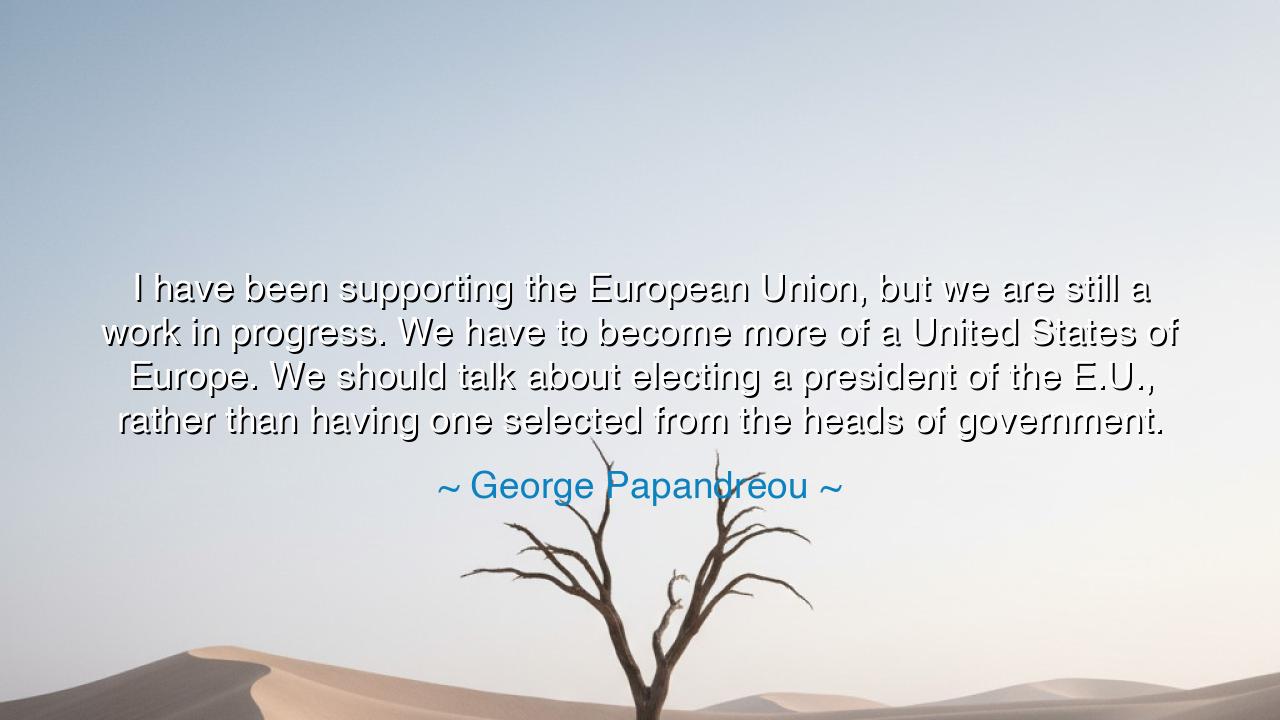
I have been supporting the European Union, but we are still a
I have been supporting the European Union, but we are still a work in progress. We have to become more of a United States of Europe. We should talk about electing a president of the E.U., rather than having one selected from the heads of government.






"I have been supporting the European Union, but we are still a work in progress. We have to become more of a United States of Europe. We should talk about electing a president of the E.U., rather than having one selected from the heads of government." – George Papandreou
In this visionary declaration, George Papandreou, the former Prime Minister of Greece, speaks as a statesman who has witnessed both the promise and the peril of European unity. His words resonate with the yearning of a continent that has long sought to turn shared ideals into shared identity. The European Union, he admits, is still a work in progress, a grand experiment in cooperation that aspires to overcome centuries of division. His call to “become more of a United States of Europe” is not a demand for imitation, but for evolution—a call to transform a fragile alliance of nations into a living, breathing community of destiny.
The origin of this quote lies in the aftermath of Europe’s financial crises, when the Union’s structural weaknesses were laid bare. Papandreou, who led Greece during the storm of debt and austerity, saw firsthand how a Europe without full unity could fracture under pressure. He understood that economic integration without democratic cohesion breeds resentment and instability. His vision of electing a president—a leader chosen not by elites, but by the will of the people—was a plea to make Europe not merely a union of governments, but a union of citizens. For democracy, he knew, must not end at the borders of nations; it must expand to embrace all who share a common future.
Papandreou’s sentiment echoes through the corridors of history. For Europe has always been a paradox—a land of enlightenment and war, of shared civilization and recurring division. After the devastation of two world wars, leaders like Robert Schuman, Konrad Adenauer, and Jean Monnet sought to bind the nations of Europe together so tightly in commerce, law, and spirit that future wars would become impossible. The European Union was born not as an empire of conquest, but as a federation of peace. Yet, as Papandreou reminds us, peace alone is not unity. True union requires a shared sense of purpose, and that cannot be decreed—it must be chosen, renewed, and defended by the people themselves.
History offers another mirror in the formation of the United States of America, whose founders faced a similar trial. After their revolution, the young American republic struggled under a weak confederation where each state guarded its power and mistrusted the others. The result was stagnation and crisis—until they forged a new constitution, creating a stronger union governed by common principles and elected leadership. Papandreou’s words draw from this lesson: that unity without shared governance is an illusion, and that sovereignty, when scattered, becomes fragility. The transformation from a confederation to a federation gave America endurance; he envisioned a similar awakening for Europe.
Yet Papandreou’s vision is not without challenge. Europe’s nations are ancient, each with its own language, culture, and memory of independence. To become “a United States of Europe” would require not the erasure of these differences, but their harmonization—a balance of unity and diversity, of common law and local soul. It would require leaders who understand that patriotism and cooperation are not enemies, but allies in the service of peace. His call for an elected president was thus symbolic of a deeper truth: that legitimacy cannot be appointed—it must be earned by the consent of the governed.
There is also a moral dimension to his message. To “support the European Union” is not merely to support an institution—it is to believe in a vision of collective human progress, where nations learn that solidarity is stronger than suspicion. In a world torn by nationalism, inequality, and fear, Papandreou’s dream shines as both ideal and warning: if Europe fails to unite, it may once again fall prey to the ghosts of its past. The unity he speaks of is not merely political—it is spiritual, rooted in the recognition that our destinies are intertwined, and that democracy must grow as wide as the civilization it protects.
The lesson, therefore, is clear: true strength is born not of division, but of shared purpose. To build a just society—whether a nation or a continent—each person must feel both represented and responsible. Democracy cannot remain confined; it must evolve, expand, and deepen, lest it wither beneath the weight of bureaucracy and indifference.
And so, the practical actions are these: participate in the shaping of your world, not as a spectator, but as a citizen of something larger than yourself. Demand transparency, demand representation, and above all, demand unity with justice. For in the words of Papandreou, the work of building a “United States of Europe” is not the labor of politicians alone—it is the sacred task of every soul who believes that freedom, cooperation, and dignity belong not to one nation, but to all humankind.






AAdministratorAdministrator
Welcome, honored guests. Please leave a comment, we will respond soon